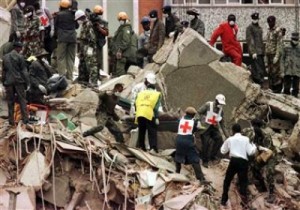
In an effort to capture two prominent al-Qaeda members, U.S. forces conducted two raids in Libya and Somalia on October 5. Both members, Anas al-Liby and Abdukadir Mohamed Abdukadir, also known as Ikrima, were wanted for their connections to the 1998 bombings of the U.S. Embassies in Kenya and Tanzania that killed 224 people and injured another 5,000. While commandos were able to capture al-Liby, they failed in capturing Ikrima.
The capture of al-Liby is a big success in Washington’s fight against al-Qaeda. According to Al-Jazeera, al-Liby was indicted by the Federal Court for the Southern District of New York in 2000 for his alleged role in planning the bombings of the U.S. embassies in Dar es Salaam, Tanzania, and Nairobi, Kenya on August 7, 1998. Currently, al-Liby is being interrogated aboard the USS San Antonio off the coast of Libya. He will be interrogated for sixty days before being transferred to the Federal Court in New York to stand trial. This comes as three U.S. Senators, Lindsey Graham, Kelly Ayotte and Saxby Chambliss, wish to send al-Liby to Guantanamo Bay’s detention center for further interrogation. U.S. President Barack Obama, however, is reluctant to send more alleged terrorists to Guantanamo due to a desire to close the detention center which has housed numerous untried accused terrorists for years and received criticism from various human-rights groups.
Meanwhile, the raid in Somalia was unsuccessful. U.S. forces planned to capture Ikrima, a senior commander in al-Shabab, an al-Qaeda-affiliated Islamist terror group that controls large swathes of territory in mostly lawless Somalia. A spokesman for the Pentagon, George Little, told the BBC that Ikrima was closely associated with two now-dead al-Qaeda members Harun Fazul and Saleh Ali Saleh Nabhan, who helped with the 1998 embassy bombings and later attacks on a hotel and airline in Mombasa, Kenya in 2002. The raid, however, was aborted after a guard for Ikrima’s compound in the coastal Somali town of Barawe sounded an alarm. Out of concern for heavy civilian and possible American casualties, the commandos withdrew from Barawe and returned to a waiting U.S. ship in the Indian Ocean. Though the commandos managed to kill one al-Shabab fighter, Ikrima was not captured or killed in the process.
The raids against Islamist militants in Libya and Somalia highlight the United States’ increased attention to terror networks operating in many African countries with unstable régimes. According to Reuters, during a press conference on October 8, President Obama made clear that in cases where local governments lack the capacity to fight terror groups, the United States was “going to have to continue to go after them.” Contested political authority has contributed to increased instability across North Africa. With the fall of longtime rulers in Tunisia, Egypt, and Libya since the Arab Spring, many al-Qaeda affiliates have taken advantage of the political turmoil and set up operations in these countries. Somalia has become a haven for terror networks, as it has been in near anarchy for over twenty years since the overthrow of dictator Siad Barre in 1991. Many analysts predict that until authority is reestablished in these unstable countries, the United States will not hesitate to conduct similar operations like in Libya and Somalia in the future.
